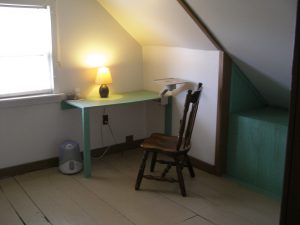by Jenny Rose | Feb 12, 2022 | A Flourishing Woman, The Journey
I’ve written before about rewriting our personal narratives. I’m revisiting the idea, this time in terms of rewriting the past.
Pete Walker’s material on complex post-traumatic stress disorder suggests revisiting old traumas remaining in our memory as painful, nonhealing wounds, and rewriting. He talks about it in terms of time travel. One goes back, as an adult, into memories of childhood and enters the scene as a new character, creating a new and different narrative. Our adult selves can defend our child selves, shield them, help them explain themselves, provide comfort to them, and, if needed, remove them before whatever terrible experience occurred.

Photo by Angelina Litvin on Unsplash
Intrigued, I tried this method, and I was shocked, though I know the power of stories, at how well it worked and how much fun it was. Not only has it helped me heal from past trauma, it also strengthens my ability now to automatically stay on my own side and defend myself.
Seth Godin also talks about this concept. His language is “rewriting the script.” Same idea, slightly different presentation. Godin is business oriented, while Walker is psychology oriented.
Godin suggests, instead of saying to ourselves “here we go again,” we simply rewrite the script this time, which means we throw away our expectations and take each experience as a fresh one, rather than another terrible iteration of something in our past.
This is powerful for me as we navigate the process of moving house. I’ve done it more times before than I want to count, and I’ve always found it deeply traumatic, but this time is different. In spite of broken contracts, changing timelines, obstructions and reversals, and the usual financial and physical stresses, I’m managing to stay grounded and balanced. It feels like a rough patch, for sure, but I don’t feel traumatized. I have moments of amusement and even more moments of curiosity. What on earth will happen next? How will this all work out? Where will I be sitting in 6 months?
Old traumas and wounds are just that – old. We don’t have to insist new, similar experiences cut as deeply. It is a choice, although not an obvious one. We could just tear up our old scripts, the ones that hurt us, the ones that never work out for us, the ones filled with fear and heartbreak, and write a new one. Now does not have to be the same as then.
In yet another way to think about this, I came across advice from a writer on how to appreciate one’s progress. She, too, suggested time travel. If we feel stuck and as though we’re making no progress, and never have, and never will, and what person X told us way back when we were children, that we’ll never amount to anything, seems a curse we can never lift, we can sit quietly with ourselves and think back a year, or five, or ten. Stepping back helps us gain perspective and see exactly how far we’ve come, how much we’ve learned, how much we’ve grown. What if we went back, in imagination, to cheer on the self we were a year ago, whispering to them of all the wonderful progress ahead?
Scripts and storylines can be changed. We don’t have to give them our power. It’s so easy to forget that. It takes an act of presence and will to change the script and reclaim our power, but we can let go of our limiting expectations and beliefs and allow ourselves a different kind of experience. Not here we go again, but here’s a new experience – I wonder what will happen?
Sometimes all we need to do is shift our gaze from the hopeless and frightening places where we have no power and focus on the places we do. If we can stay there, rest there, live there, the chaos and tumult, though unpleasant, won’t knock us down and trample us. Such times pass by, pass over without traumatizing us, and we’ll come out on the other side more resilient than ever.

Photo by Leon Liu on Unsplash
by Jenny Rose | Jan 22, 2022 | A Flourishing Woman, Creativity
One of my greatest unconscious defaults in life is avoidance. I know now, thanks to Peter Walker and his work, avoidance is a natural trauma response.
Nothing makes me crazier than people who avoid unpleasant things.

Photo by Ian Espinosa on Unsplash
Is there a pattern here? (Laughter in the wings.)
I’m thinking about this because I’m steadily publishing my fiction in serial form on Substack, week by week, about 10 pages by 10 pages, and it’s a challenge.
Something in me wants to avoid revealing my own creativity. My writing takes me to some dark, and some people would say inappropriate, places. Every week (I just posted for the 8th week), I push myself through whatever the content of my post happens to be. More than that, I deliberately take it on in an accompanying essay.
I’m an expert in self-sabotage. I’ve been doing it my whole life, largely through simple avoidance. At the same time, it appears my previously intermittent and now increasing tendency to call a spade a spade and be honest about my experience is one of the characteristics others struggle with most when they deal with me.
It’s a strange paradox, and it creates ongoing internal tension.
The avoidant part of me is childish and disempowered. The direct, take-the-bull-by-the-horns part of me is powerful and hangs out with Baba Yaga.
I love the direct part of myself, but I don’t think anyone else can. I think others want the avoidant woman, because she’s so damn “nice.”
Ick.
When I first began writing creatively, I thought it would all be sweetness and light, love and romance, happily ever after.

Photo by Peter Forster on Unsplash
As the years passed, and I expanded out of (mostly bad) poetry, played with writing oral stories, and then started seriously writing fiction, my output took a darker turn. The sweetness and light included bitter and dark. The love and romance became raw sensuality and included detailed sexual content. I took old fairy tales, cleansed by the brothers Grimm and others, and excavated the darker, dirtier, more violent roots. My characters graphically tore out eyes and watched them change into marbles. They killed people. They ate people. Shapeshifters had sex. Towers fell. People went to war and practiced genocide.
My writing wasn’t dark on every page, but it wasn’t sweetness and light on every page, either. It made me cry. It made me cringe. It made me uncomfortable because of its emotional power. I wondered at myself. Yet never have I been so captured, so challenged, so confident, so happy as I am when writing.
After all, in those days almost nobody read it! I wrote for myself, and held nothing back.
Now I’ve deliberately changed that. Now anyone can read it. And some people are.
For a while I considered cutting the parts I judged as being too … what? Too honest? Too sexy? Too potentially offensive? Too violent? Too real?
Yes. All those things.
My impulse was to avoid revealing myself. Stay safely hidden. Stay small. Refrain from making myself or anyone else uncomfortable.
Even as I considered that, I knew I wouldn’t. I knew I couldn’t betray myself that way. If I’m to be judged as not good enough, I want the judgement based on the deepest, most complex, most powerful and honest work I’m capable of.
Because that’s the only way my writing is good enough for me.
My Substack post last week included explicit sexual content. There will be more, but that was the first. I wrote an essay to go with it titled “Creating the Webbd Wheel: Sex.” I’ve been worrying about that post for weeks. In the end, I kept it simple and direct. I was writing about sexual content. The title was clear. Why prevaricate?
Substack provides writers with statistics 24 hours after they post, and I was informed my essay got the most reads of anything I’ve posted so far.
I’ve been giggling ever since. So far, nobody’s given me a bad time about my sexual content, but even if they do, I know I was right in what I wrote in that essay. Nobody wants to talk about sex, and we all have a lot of judgement and fear around it, but that doesn’t mean it occupies none of our private attention. We can’t amputate ourselves from our sexual nature, no matter how much we wish we could or others tell us we should.
I will probably unconsciously default to avoidance for the rest of my life. It’s a deeply-rooted pattern. I’m socially rewarded for being “nice.” On the other hand, I personally value authenticity and honesty far more than I do niceness. I want to grow up to be direct and clear. Not mean, but not avoidant or arguing with what is, either. It’s a fine line, one I don’t walk steadily or gracefully.
But I’m not going to avoid the attempt.

Photo by Jon Flobrant on Unsplash
by Jenny Rose | Jan 8, 2022 | A Flourishing Woman, The Journey
All my life I’ve felt traumatized by how frequently I’ve moved house. My general insecurity makes uprooting myself a fearful ordeal.

Maine Farmhouse and Barn
This time, as we go through the process of selling this old farm and searching for a new place, I’m realizing for the first time how valuable my experience of moving is. My resentment about it is falling away.
I know most people approach finding a new home from the will-this-place-suit-me direction, and that’s probably practical and sensible. I can and have done that many times, but I also spend a lot of time thinking about whether I will suit the new place, and being curious about how I might fit my life into it rather than forcing it to accommodate me.
I do this because, as I’m realizing now, every place I’ve lived has changed me, challenged me, and shown me new aspects of myself. I’ve never had much money and therefore been unable to have a wide choice or completely renovate, so I’ve learned to adapt and adjust to wherever I am. For the first time in my life, I’m seeing what strength and power lie in that kind of resilience.
I’ve lived in homes, apartments, dorms, a trailer, a log cabin, and my parents’ home (as an adult). I’ve rented and I’ve owned, bought and sold, and been a landlady. I’ve lived with husbands, my kids, assorted animals, and friends. I’ve lived by myself. I’ve lived in large places with ample storage and closets and small places with one closet in the entire house.

Now, as I approach my 60s, I think I know a lot about what I need, what’s important, and how adaptable I am. Of course, I thought that at 50 when I came to Maine, but this old farmhouse taught me a great deal more. And the new house will teach me yet more. During my time in this house, I also became a minimalist, which has had a huge impact on my priorities and the amount of stuff I manage.
Leaving the place I know, no matter what this house’s challenges, is hard. I am, at least, familiar with the current problems and challenges. But I also know what I love; I’m already grieving the loss of this beautiful 26 acres, the gardens, the wildlife, the views out the windows, the way the sun comes into my little attic aerie, and the shrill spring song of the peepers in the pond.
I realize, however, that the next place I live will present me with new joys. I don’t know what they will be. They won’t be exactly like what I’m leaving. But a new space holds new possibilities and new discoveries, along with fresh challenges.
The thing about limits and challenges is the opportunity they hold. I’m excited by the prospect of creatively solving problems I encounter. One of the good things about having little financial resource is that I’ve been forced to rely on creative, low-cost solutions. If one doesn’t have money to throw at problems, one has to find another way.
Finding another way has always been a journey worth taking for me, a journey into my own power, ability, and creativity. Without the help of abundant money, it can seem like a long, slow, journey, uncomfortable and occasionally even tortuous, but filled with discovery and satisfaction. The new space and I will work together to make something functional and beautiful. We’ll find out about one another. We’ll take care of one another.
We’ll make a new home together.

Jenny’s attic is waiting for her. Fall, 2014
by Jenny Rose | Dec 18, 2021 | A Flourishing Woman, The Journey
Last month, Seth Godin wrote about The Lifeguard Hack. Being a lifeguard, it made a lot of sense to me.
This week my team (of lifeguards) and I spent some time in the water training.

Photo by NeONBRAND on Unsplash
Just before Halloween, I pulled the trigger on finding another place to live, right around the same time I decided to serialize my fiction on Substack.
I wasn’t ready to do either of these things, and I’m not ready to have to go in the water and rescue someone at work, either.
Wait! Let me think about this some more. Let me prepare. Let me figure out how to do it perfectly.
Except life doesn’t wait.
Godin is so right. When someone is drowning, I’m going in. It doesn’t matter if I have the proper gear, equipment, attire, or level of energy and alertness. The temperature of the water doesn’t matter. I won’t wonder which form of entry to use. I won’t plan an approach. I probably won’t follow the exact script in our Emergency Action Plan. None of us will. I will blow my whistle, and if I don’t have my whistle, I’ll yell. Loudly. And I’ll go in.
I’ve moved house before. I’ve sold, bought, and figured out how to make it work. I’m not ready, because no one ever is ready, at least not if ready means knowing every detail beforehand. I wouldn’t have planned to decide to do this in late fall with winter and the holidays looming ahead. It just unfolded that way.

I’ve been thinking for years about ways to get my fiction into the world. Why Substack? Why now? Especially why now when I decide at the same time we need to move?
I don’t know. It’s time. It’s just time.
We re-certify every two years to keep our lifeguard status, and we train frequently. I have experience with moving. I have a disciplined writing practice and am an experienced blogger.
Performing a water rescue, buying a new home and moving into it, publishing on Substack, are all things I can do. I’ve done them, or something similar to them, before. There will be no perfect time. Rehearsing won’t help me. It’s just a way of allowing my anxiety and all the critics in my head to sabotage me.
While we’re hesitating, afraid of failure or less-than-perfect, opportunity slips away. While we’re waiting for the “right time,” we’re losing the time we have now. While we’re rehearsing how to pull a passive victim off the bottom of the deep end, they’re drowning.
For me, the key is not so much courage, which I have plenty of. It’s confidence I struggle with. But a lot of my struggle with confidence is based on old lies and distortions that are not real. I know I can perform a water rescue because I’ve done it before, many times in practice and a couple of times in real life. It wasn’t perfect. It didn’t look like the Red Cross training videos, where everyone is calm, the sun is shining, and it’s all by the book. But nobody drowned. Nobody died.
I hate moving. It opens up a lot of old trauma. But we need to move, and I know I can do it. I know liquor boxes make the best book boxes. I know how to show a house. I know how to navigate the legalities. I know where my power is, and I know what I can’t control in the process. It’s a familiar journey. Waiting for nicer weather, for the market to get better for sellers, better for buyers, or more stable in general; waiting for loans to be easier to obtain, or interest rates to go down, or to win the lottery; waiting for the stars to align just right because I’m scared, is not effective. The time is now. We’ll figure it out. Whether we have two years or a month of the process ahead of us, it’s begun and it will play out the way it plays out. It will be stressful, and exhausting, and a chaos of boxes (and cats) and belongings, tape and markers, and things we can’t find. It won’t be perfectly thought out or executed.
On Substack, people will read or they won’t. People will like the fiction, or they won’t. They’ll tell their friends and share it, they’ll comment, they’ll help me build a healthy, interactive community engaged in discussing community, story, and how to live more effectively on our planet, or they won’t. I didn’t start out perfectly. I go back every couple of days and tweak things. I’m figuring it out as I go.
We figure life out as we go. Our friends help us. We learn. We adjust. We make mistakes. We do our best.
So, yeah. If you go down in one of our pools while I’m on the stand, I’m coming in after you, and the rest of my team will be right behind me. I’m not ready. But I’m coming in.

Photo by Chris Kristiansen on Unsplash
by Jenny Rose | Dec 11, 2021 | A Flourishing Woman, The Journey
I subscribe to Seth Godin, who provides me with a few sentences of daily food for thought in my Inbox. This week, I read this link about the difference between accuracy and precision.
Godin’s distinction between the two is one I never thought about before, but I have been thinking about roots.

Photo by Arun Kuchibhotla on Unsplash
Deep roots. Strong roots.
Roots grow toward sustenance. They don’t grow toward, or in, barren soil. Cell by cell, rootlet by rootlet, inch by inch, they spread, seeking water, seeking the soil and mineral resource they need. Cell by cell, stem by stem, twig by twig, inch by inch, trees and plants grow aboveground in search of sunlight.
Trees and plants want to live. They seek the resources necessary to do so. Survival is their simple, accurate agenda. A seed germinates and grows toward successful reproduction, wherever it happens to be.
Exactly how the roots and crown need to grow, exactly where the best sustenance and water will be found, exactly what the quality and quantity of sunlight will be, all these precise determinations have no meaning unless the imperative to survive exists, and can’t be planned ahead. It all depends on context.
The accuracy comes first. Then the precise details.
I’m thinking about this because we are relocating, not from Maine, but from this old farmhouse.
A year ago, I wrote a series of posts about holistic management, and I’ve been reviewing my holistic plan regularly ever since. My intention, my accurate intention, in Godin’s language, is to create a simpler, more sustainable life.
The precise details? Well, that’s a hairball of monstrous proportions that’s currently keeping me up nights.
Maybe it doesn’t need to. I started with an accurate intention and have taken all kinds of steps toward that, not only with my physical living situation, but also with my writing and life in general. The precise details of each of those steps were not visible to me a year ago when I created my plan and started acting. I moved forward, and identified and dealt with specifics as I came to them.
When I was younger, I had an easier time with big changes, because there was always time to adjust, to go back, to change my mind, to make another choice in the future. But now, as my partner and I age, it feels more urgent to get it exactly right and position myself perfectly for any eventuality.
This is silly, of course. The things we agonize over usually never happen, and if they do, they don’t happen in the way we predicted. The challenges we do encounter are often complete surprises we could never have foreseen or imagined.

Photo by yatharth roy vibhakar on Unsplash
Godin’s thought for the day reminded me, again, that life is a journey. It’s a process. It unfolds. Much as I’d like to know exactly where and when, who and how, those precise details are hidden in the future. It’s not time to know them yet. Right now, today, I need to live those questions and steer with my intention: a simpler, more sustainable life.
That’s the tree I planted last year. Now it’s beginning to grow. The roots are seeking nourishment. The plant aboveground is seeking sunlight. When I look back over the last twelve months, I can see how much growth there’s been, but as I lived the last year I didn’t think about growth or progress. I dealt with specifics arising out of my accurate, intentional seed and put one foot in front of the other.
Now we approach the still, dark, heart of winter, and as I take stock, look over my shoulder and raise my gaze to the horizon ahead, I realize afresh movement in the right direction is what counts. The specifics reveal themselves in their own time. Whatever my feelings of anxiety, fear, and overwhelm, I’m also flowing in the current of my accurate intention.
I’m forced to admit I have a choice. I can rest in faith in myself, in my intentions, and in life generally. I can cultivate my curiosity and sense of exploration, discovery, and fun.
Or I can make myself miserable trying to figure out every single detail yesterday and pushing this important transition to go as fast as possible so I don’t have to feel my feelings and wrestle with my panic-stricken thoughts any more.
It’s really not a choice I want to make. I don’t feel I have the energy to fight my compulsion to speed like a maniac through my life right now, obsessing about money, cleaning, and showings, collecting and packing boxes, and checking online every 10 minutes for new MLS listings. In Central Maine. In December. In our modest price range.
But even as I think that thought, I know it’s a lie. Whatever will be, will be. There’s only so much power I have in this picture. What’s really at stake is whether I enjoy the ride as much as I can or exhaust myself, risking illness and injury, just when I most need to be healthy and whole. One way or another, we are leaving this place and necessarily going somewhere else. Part of me wants to throw up my hands and spin out of control, but the wiser, saner part of me sees the choices clearly and knows which ones to make.
Sigh.

Maine Farmhouse and Barn
by Jenny Rose | Dec 4, 2021 | A Flourishing Woman, Minimalism
Asking the right question is powerful. Answering it honestly is a superpower. Good questions unlock doors and windows in our minds and hearts, and honest answers allow light into dark, dank, haunted places within us.

Photo by Craig Whitehead on Unsplash
For me, part of the magic of good questions is the challenge to think bigger and more creatively. Questions help me focus on problem-solving.
Life is all about problem-solving.
So, here are three questions. The first is from Joshua Becker on Becoming Minimalist. The others were inspired by his post:
- If I didn’t have this thing, what would I use instead?
- If I wasn’t doing this activity, what would I do instead?
- If I wasn’t investing my time, energy, and power here, where would I invest them instead?
In the first questions, the thing, whatever it is, may be something you’re not using in the first place. But if you are, or you think you are, or you have, or you think you might need to sometime in the future, ask yourself if you didn’t have it, what would you use in place of it?
If I didn’t have this apple corer, what would I use instead?
A knife.
A good kitchen knife is multipurpose. An apple corer is not.
If I didn’t have a TV habit, what could I do instead?

Photo by Frank Okay on Unsplash
Spend actual face-to-face time with someone. Read a book. Take a walk. Play with pets. Exercise. Play a game. Go outside.
If I wasn’t consumed and exhausted by stress, anxiety, toxic mimics, or unhealthy relationships, what could I have energy for?
Creativity. Spirituality. Learning. Healing. Growth. Healthy connections. Rest.
I don’t suggest a ban on apple corers or TV. These questions are not weapons with which to make ourselves bad and wrong. The point is that asking the questions reminds us we are making choices and gives us a chance to consider whether or not our choices are adding value to our lives and taking us in the direction we want to go.
Do we really need a bigger kitchen to house our collection of apple corers and other gidgets and gadgets that do the work of a good knife?
Do we really need three, or six, or nine different streaming services and a steady diet of however many hours of TV a day?
If we ask and answer these questions intermittently during our day, what might we learn about which activities and objects are useful and valuable and which are not? How would our relationships look through the lens of these questions, beginning with our relationship with ourselves?
How could we engage with subtractive problem-solving?
I would rather have one multipurpose object, tool, or activity than several specialized ones. Simple is easy. Simple is clear. Simple takes less time, money, space, and energy.
Here’s the downside of good questions requiring honest answers:
We might not like the answers.
If we ask, if we answer, we may find out things we don’t want to know, which might be why we’re unconsciously busy spinning our wheels in the first place.
This is the old French story about Bluebeard. Once his young wife looked in the forbidden room and saw all his former headless brides, she couldn’t unsee it. There was no going back.
This kind of self-inquiry is a choice. We may not want to. We may not be willing to. That’s OK. Life has a way of increasing the pressure until we are forced to go in the direction of our fear and resistance. On the other hand, maybe you’re a person with no emotional, physical, or thought clutter. Maybe you have no time-wasting coping mechanisms and habits. Maybe your kitchen drawers are clean, functional, mouse free, and contain nothing but a few useful multipurpose tools you use regularly. Maybe all your relationships are perfectly healthy. Good for you! I’m jealous.
My life (and my kitchen) is messier than that. I spend too much time and energy in non-useful activities, and even more time and energy being hard on myself for it. I worry, and make up stories, and work hard to stay defended and hidden.

Photo by Angelina Litvin on Unsplash
If I didn’t spend time playing online solitaire in an effort to manage uncomfortable feelings or fatigue, what could I do? Write? Take a walk? Relax with a book? Dance? Journal? Talk to a friend? Scrub a floor?
It’s not that solitaire is necessarily bad. The question is, would another activity be better? A walk takes care of exercise; spending time outside; and spending undistracted time with myself or a friend, pet, or loved one. A walk is a multipurpose activity. Solitaire is not.
I need a good kitchen knife. I need to be outside and exercise.
Do I need an apple corer and online solitaire?
(Well, no. But maybe I want them. That apple corer is mine (this is called the endowment effect). I paid good money for it! Maybe I used it once. Maybe I’ll use it again one day. I deserve to relax and take a break now and then. Solitaire is better than TV or a social media habit. It doesn’t hurt anyone. I need some downtime in my day.)
I’m not here to argue with you. I want you to have what you need. I want what I need, too.
Just asking the questions!

Photo by Das Sasha on Unsplash















